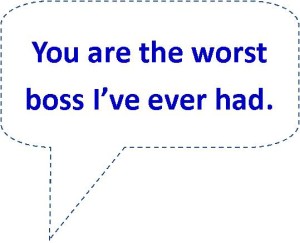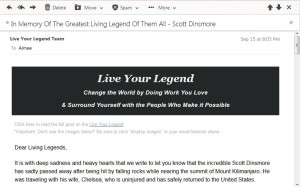Archive for September, 2015
How to Survive a Horrible Boss
 Unfortunately, most of us will report to a boss that we hate at least once in our working lives. If it is just once, consider yourself lucky. I have a friend who has reported to five complete jerks and only two normal people in 15 years. It has been so tough on her that whenever she leaves one jerk behind to take a new role, I’m scared that the new boss will turn out to be just as jerky as the last.
Unfortunately, most of us will report to a boss that we hate at least once in our working lives. If it is just once, consider yourself lucky. I have a friend who has reported to five complete jerks and only two normal people in 15 years. It has been so tough on her that whenever she leaves one jerk behind to take a new role, I’m scared that the new boss will turn out to be just as jerky as the last.
A horrible boss can take many forms. She might yell at you or humiliate you. He might take credit for your work and blame you for his mistakes. She could try to sabotage your career out of spite. He could constantly change the direction of your projects, favor your teammates while disparaging you to others, threaten to fire you, or otherwise bully or harass you. Do any of these characteristics remind you of someone you’ve reported to?
The good news is that if you are stuck with a lousy manager, there are coping mechanisms that you can use until you or the creep move on.
One: Make friends with your boss’s peers. This is a strategic maneuver. If your boss’s peer group respects and likes you, then your boss has more to lose by treating you poorly. For example, if you provide information, resources, or anything else of value to another team within your department and you do it well, that team will not want you to get fired or quit in frustration. Get to know the managers of these groups. Show interest in them. Ask how you can provide additional value.
If the people in these teams don’t provide positive feedback to your manager on their own and you have an ally you can trust, ask that person to send an email touting your contribution. If you are visible in the department as someone whom other teams respect and depend on, your manager may grudgingly treat you better.
Two: Make friends with your boss’s boss. As with your boss’s peer group, being visible to your boss’s boss is essential. This person must know your name and recognize you when he or she sees you. If your work culture supports “skip-level” meetings, take advantage of it. Find out what this person cares about, worries about and what the goals are for his or her area of responsibility. Then think of smart questions to ask that will be easy for that person to answer. Ask about factors that contributed to recent successes. Treat the person like a respected mentor – say that you want to excel in your role and ask how he or she achieved career growth.
When you pass your boss’s boss in the halls, say hello and add any personal comment that is appropriate. If he or she has only recently met you, start off with, “Hi Cheryl, it was great to meet you the other day. I’m Joe Smith on Roger’s team. Thanks for the advice on the XYZ.”
Be natural and genuine, not smarmy!
Then when it is time for your boss to get approval for who to gives promotions or bonuses to, or how individuals are rated in performance reviews, your odds of having a favorable outcome are significantly increased than if you are completely unknown.
Three: Document your work and email it to your boss. Figure out a schedule that is not obnoxiously often and not so far apart that it is forgettable. Maybe every Friday, or once every two weeks. Keep it short so you don’t waste time and so that it has a better chance of being read. Even if it isn’t read, it is a record of your performance that you can bring up in meetings with your manager. This exercise is to cover your ass, so make sure your boss can’t use the excuse that your emails got lost in her inbox.
A good format is to make the subject line “Joe Smith’s Project Update, October 2, 2015″, then make a bullet list of three to six in-progress or completed projects. Use as much hard data as you can to support results. Examples:
- Closed $128K in hardware sales last week, and am at 102% of my quarterly quota.
- Delivered the Safety Training to 56 client teams year-to-date. The pass-rate is 92% vs. the goal of 90%, and satisfaction survey results are 95% vs. the goal of 90%. Satisfaction is currently 10% higher than last year.
- Delivered the ABC parts to XYZ customer on October 1, 2015, four days ahead of the due date. Received a thank you email from XYZ’s purchasing manager, Jane Smith.
Four: Document your boss’s poor behavior towards you. In any crappy work situation, documentation is critical. Many public and private sector organizations require managers or the Human Resources department to create a paper trail of documentation before they fire an employee to cover their tracks in case of a complaint or lawsuit.
Turn the tables and create your own documentation about how your manager treats you. Think of it as insurance in case you need to use it to protect your reputation. Document dates, verbatim quotes, witnesses and how the action violated the employee handbook (if applicable).
Your record of events may protect you if the situation gets worse. If your boss violates company policy towards you, maybe she has done the same to other people. Someone may have raised complaints in the past. If you decide to speak up or find yourself defending your integrity, your notes are likely to impact the outcome.
If you are fired, you might be able to use the documentation to get unemployment benefits. I know people in multiple states who have done this!
Or, you might choose to never disclose your notes. If so, it wasn’t a wasted effort. The act of documenting your reality is cathartic and can prevent you from feeling like you are the crazy one. Bad managers often specialize in lowering employees’ self-esteem and making them feel like failures. Don’t let them have that power over you.
Five: Remember that your manager doesn’t own you. I deliberately avoided using the terminology for a manager as someone “you work for.” You actually work for the organization – your manager is just the person you report to. I don’t even like the word “boss”…because you are the boss of your life and that person is only charged with the responsibility to manage you as an employee.
Your work is one part of your life, not your whole life. Don’t let your manager “follow you home” and ruin your weekends. Make that person as insignificant in your life as possible by focusing on what you do have influence over (see numbers 1 – 4!).
If you are currently dealing with a horrible manager, I hope you will have a new manager soon! Refresh your resume and LinkedIn profile. Get testimonials about your performance if possible (see numbers 1 and 2!). Save copies of your achievements and kudo’s from coworkers or customers (see number 3!). Brush up on any important skills and stay on top of current trends and technologies in your field.
And until then, I hope these tactics help you survive.
A Tribute to Live Your Legend’s Scott Dinsmore
 When I received an email from a friend letting me know that Scott Dinsmore died in a climbing accident, I was in disbelief. I receive his Live Your Legend email newsletters and had been tracking his yearlong journey around the world. He and his wife had been meeting with local Live Your Legend groups and were taking a break to climb Mt. Kilimanjaro. I had just read his newsletter describing his struggle to give himself permission to take a break from work to go on this climbing adventure.
When I received an email from a friend letting me know that Scott Dinsmore died in a climbing accident, I was in disbelief. I receive his Live Your Legend email newsletters and had been tracking his yearlong journey around the world. He and his wife had been meeting with local Live Your Legend groups and were taking a break to climb Mt. Kilimanjaro. I had just read his newsletter describing his struggle to give himself permission to take a break from work to go on this climbing adventure.
Scott was young and had accomplished more than most people will in their lifetimes. He gave a wildly successful TEDx talk and created courses and materials that reached people across the globe. It is sad to think of how much more he could have done to change people’s lives, and how much more he had to experience in his own.
What made the news difficult for me to believe was that Scott had a huge persona and had impacted so many people that he seemed immortal. I thought about his work and his passion and couldn’t imagine that he is no longer writing, creating and posting pictures of himself looking straight into the camera with a wide, genuine smile.
In the past few days I’ve been reading messages posted by his friends and followers on a Facebook page that was created to pay respects to him and his family. The messages were sincere and heartfelt. People who met him in person considered him a friend and those who knew him virtually also expressed personal feelings of warmth and gratitude for what they learned from him.
For me, Scott both inspired and in some small ways irritated me! He was relentless in his pursuit of living a meaningful life and I deeply admire that. He bravely quit a job that wasn’t aligned to his values to create a business that he enjoyed and benefited others’ lives. In my much smaller way, I strive to do the same.
Where we differed was that he seemed to have boundless energy for exploring, meeting and interacting with people, and he comfortably lived out of a backpack while soaking in the stimulation of new experiences. I just…don’t. While I enjoy people and adventures, I need a lot of alone time as a counter-balance. The thought of interacting face-to-face with as many people as Scott met with open arms and focused attention makes me feel frazzled. I’m a firm believer in resting and taking breaks when my body tells me I need it, and then push harder to achieve my goals when I’m restored. Feeling grounded and at peace with my life is more important to me than achieving traditional measures of success – like strong book sales when I’m finally published or growing my business rapidly.
I imagine if I had ever met Scott in person and described this, he would have listened to me with curiosity and said something like “You do you – it’s your legend to live!”
His TEDx video will live on YouTube for as long as any of those videos remain. His website and programs may continue in some form or not. It may not be immortality, but his impact on me and others will last a long time.
Scott, you lived with intention and showed us how it can be done. Thanks for the inspiration.
Macro vs. Micro
![]() A few months ago I was talking with someone about social issues in the United States. The conversation got intense. I was looking at the topic from the lens of a segment of the population that is frequently discriminated against. His perspective was that individuals should do their own thing, mind their own business, and not be offended by what other individuals do.
A few months ago I was talking with someone about social issues in the United States. The conversation got intense. I was looking at the topic from the lens of a segment of the population that is frequently discriminated against. His perspective was that individuals should do their own thing, mind their own business, and not be offended by what other individuals do.
As we calmed down and were respectfully ending the discussion, I said I was looking at it from a macro lens and he was looking at it from a micro lens. He responded, “there can be a lot of macro in the micro.”
I thought that was an interesting point, although probably not the way he intended it. On the one hand, if everybody stayed silent, there would be no movement to reform social injustices. On the other hand, sometimes the biggest problems are right in front of us and if we don’t take care of them we’re not doing the larger world any good anyway.
In a work context, it is easy to complain about what is wrong with large institutions like corporations and public sectors. Issues of inequality should be addressed, and I’ve been encouraged by seeing more and more people speak up in public forums like LinkedIn.
But what about the micro level? When a slur is spoken in our presence we can do the safe thing and mind our own business. Or we can speak up.
There can be a lot of macro in the micro.


Recent Comments